Why you may need a Magento 2 Demo store?
Magento demo store allows merchants to familiarize themselves with the functionality of the platform. With the demo, you can experience how a Magento website operates and how to configure it to meet your store requirements.
Testing out the features of a Magento store is essential when you want to know if this platform would be perfect for your eCommerce business.
List of Magento 2 Demo stores
Here are the collected Magento 2 demos. You can play around on the frontend and backend to get an idea of how the system works.
1. Firebearstudio (default theme)
Username: demo
Password: 1q2w3e4r5t
2. SimiCart PWA Demo
3. Vue Storefront PWA demo
Magento 2 Demo Features
This section is included to make your navigation of the store easier.
A demo store has two main parts, which will be explained in detail below:
1. Frontend
On the frontend, the default theme is called the Luma theme. It’s designed as a fashion store with common sections. You can work your way around this theme a bit, or you can change it to the Blank theme in the admin.

It functions like a live site so you can check out some pages to see the layouts and how products are displayed. You can also try out product search or filter, or other features that you want your store to have.
2. Admin
To see the full backend features, you can access the demo by Firebearstudio.
Dashboard
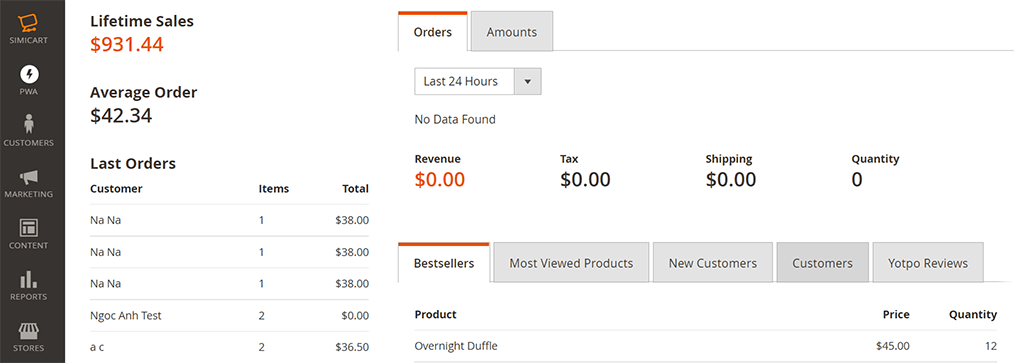
After logging in, the dashboard is the first thing you’ll see. It shows the general information about your store – lifetime sales, average order value, revenue, tax, etc, as you can see above. The interface embraces a modern and neat design that’s easy to the eye.
All sections can be found on the admin panel, on the right-side bar.
Sales
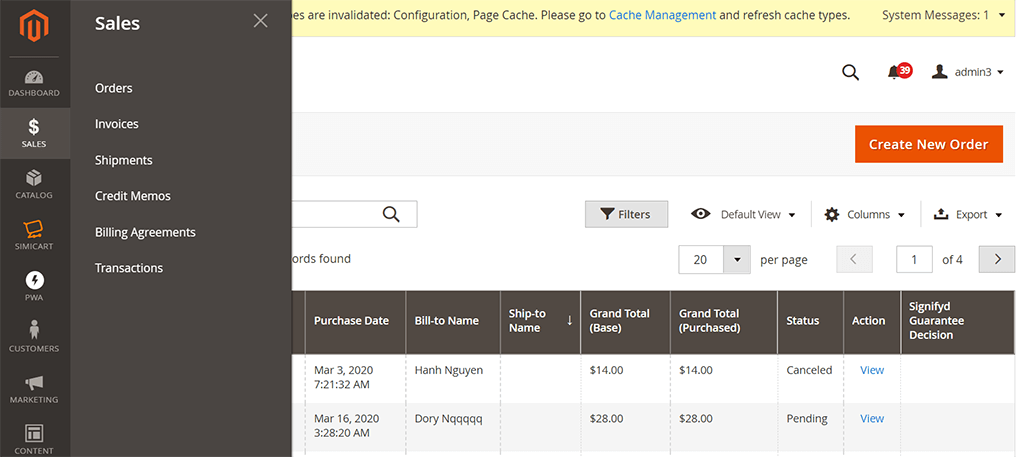
Right under the dashboard, you can see the Sales section.
There are 6 parts in this section:
- Orders: Your orders are displayed in a table with the necessary information like name, purchase date, bill-to-name, total value, etc. You can also check the details for each order.
- Invoices: all invoices generated for your customers are also saved here. When needed, you can click on each invoice to see details.
- Shipments: this section manages all shipments generated by the admin. Data shown here includes shipment date, order number, order date, total quantity, ship-to name.
- Credit memos: a credit memo is created in case you need to refund a customer, then the memo will be saved in this section.
- Billing agreements: records of all your billing agreements with customers are stored here.
- Transactions: all payment activities between your store and external payment systems are listed here.
Catalog
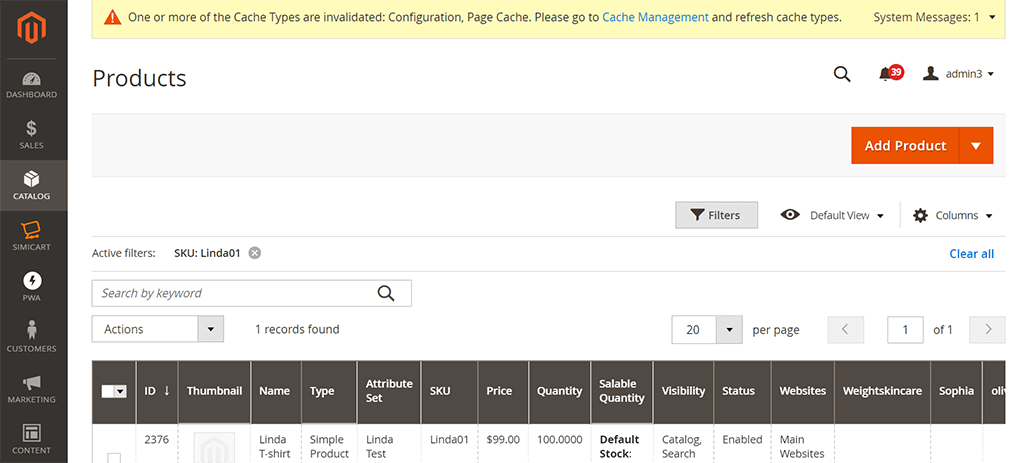
You can manage all your products and categories in this section.
- Products: navigate to this section when you need to check your product stocks, add/remove items, and make other changes regarding the product information.
- Categories: you can adjust settings for your product categories in this section – from creating a new category to edit the displayed content for each of them.
Customers
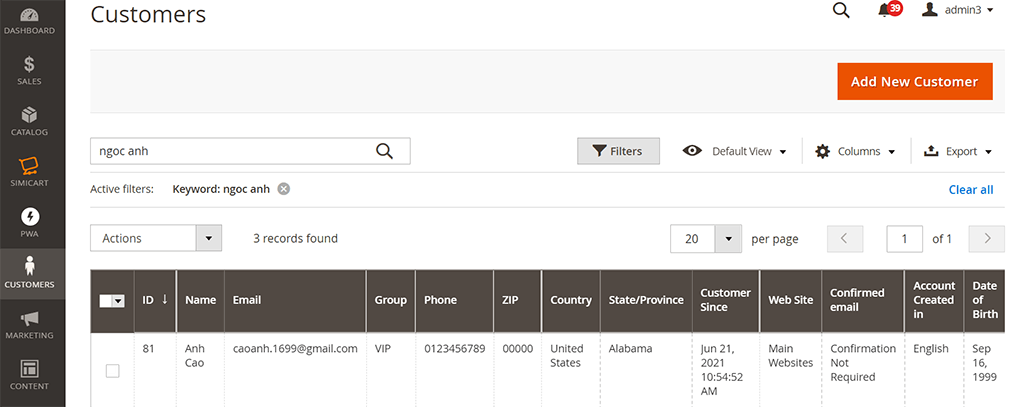
Manage all your customer information with this section
- All customers: information is displayed in a grid table like name, email, phone, group, etc. These details are collected when a customer creates an account or fills in a form to check out as a guest, but an admin can also add the information in the backend themselves. You can easily check out one’s detailed information by clicking on their name.
- Now online: specifies who is visiting your website at the present.
- Customer groups: You may divide customers into groups depends on your business goal.
Marketing
Magento 2 provides store owners with a number of useful built-in features for marketing, and you’ll work with them in this section.
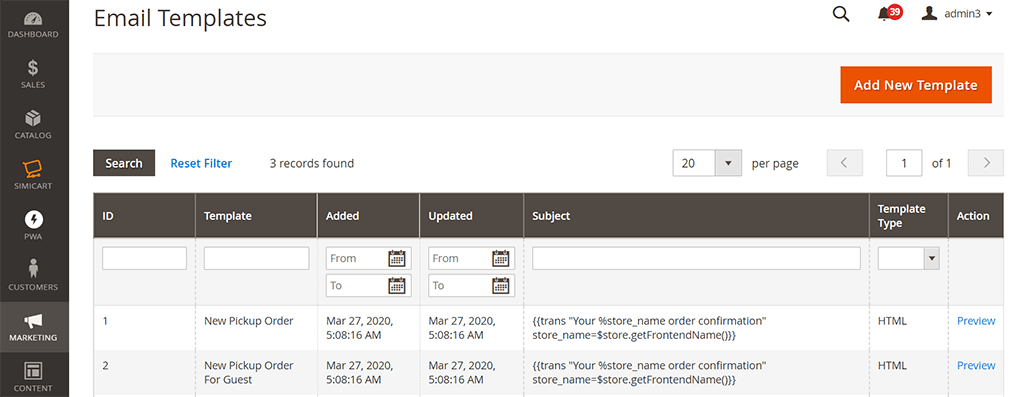
- Promotions: Set up price rules for discounts here
- SEO & search: contains features such as URL rewrites, site map, search terms, search synonyms to help you in improving your site’s SEO.
- Customer engagement: You’ll find a cloud-based tool that lets you personalize content with predictive product recommendations and create intricate segments based on web behavior data.
- Communications: you can set up emails with default templates or create your own.
- User content: all customer reviews for products are stored in this section.
- Advertising channels: enhance your brand reputation with the features included in this section like Facebook, Google Shopping Ads, etc.
Content
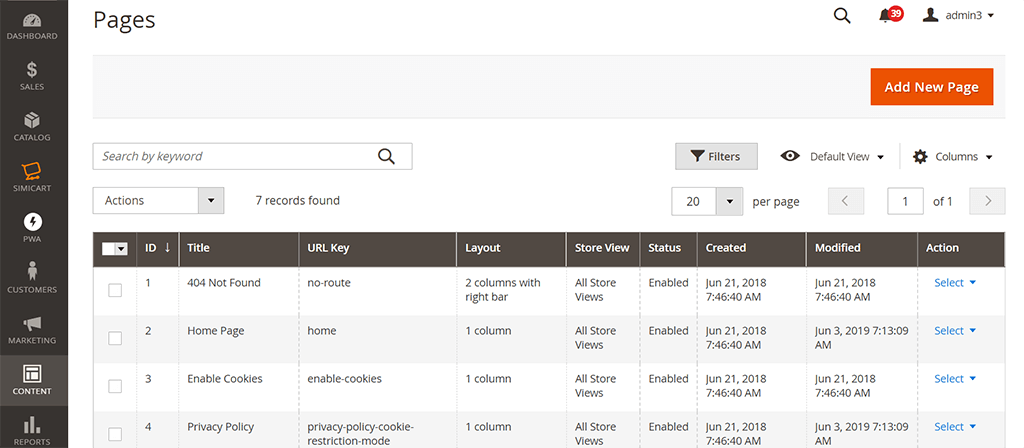
The section allows you to configure any changes regarding your site’s content, be it the elements or design.
- Elements: freely create CMS pages with elements such as texts and images, dynamic Blocks and Widgets to add to the website.
- Design: includes tools that help you to design the layout of the website, make themes changes, and schedule design changes on special occasions.
Report
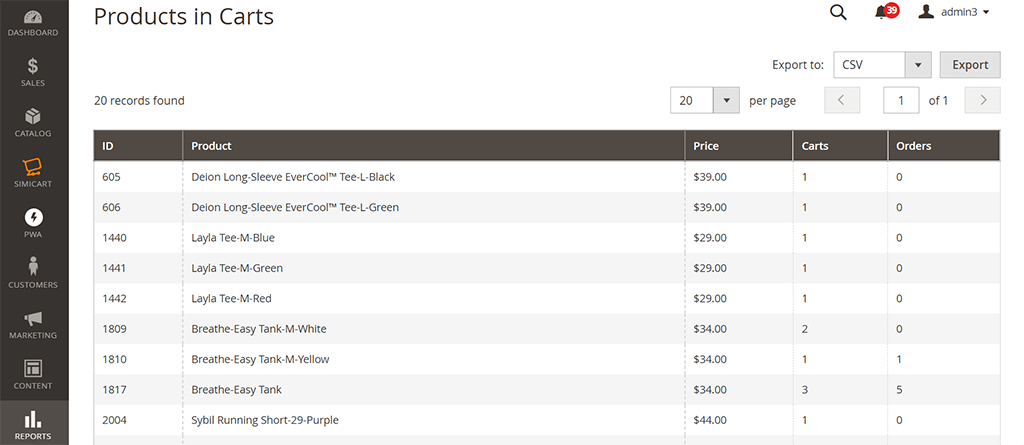
The system provides useful reports for you on a schedule and even offers advanced reporting for more insights. Here are the types of reports that you’ll find in the section:
- Sales
- Marketing
- Customer
- Products
- Reviews
- Statistics
- Customer engagement
- Business intelligence
Stores
This section is the reason why Magento is regarded as an outstanding eCommerce. It allows merchants to manage all of their stores with one account.
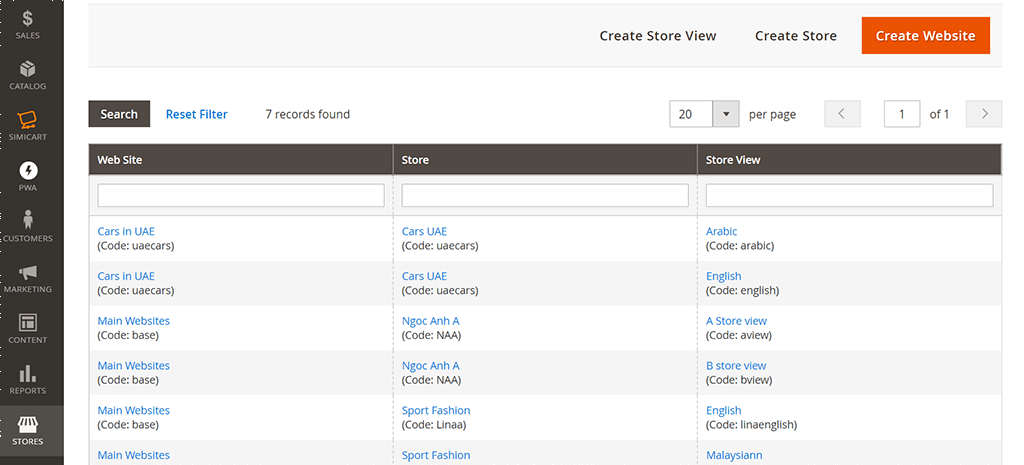
- Settings: you can configure settings for any of your stores here – country, web, content, store email address, etc.
- Currency: manage currency rate and currency symbol on your website.
- Attributes: create and manage all product attributes
- Inventory: Create sources, stocks and manage inventory.
- Taxes: create tax zones, tax rates, and tax rules to apply to products or customers.
System
Here you can perform more settings on the store, from its data to the integrated extensions.
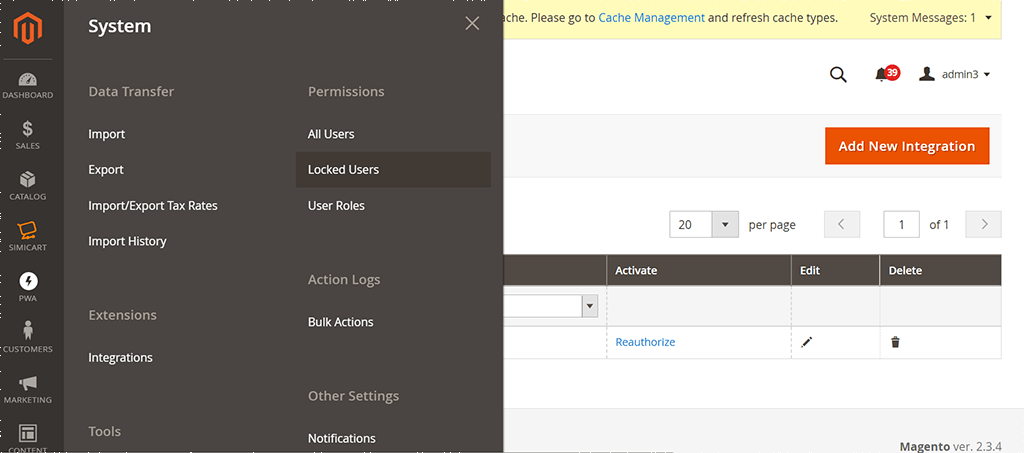
- Data transfer: you can upload or extract data from the system.
- Permission: lets you manage all users on Magento store – Active Users, Locked Users, and the specific role of each one.
- Extensions: Manage each module that has been integrated into the store.
- Action logs: records the details of mass operations that have been set to run in the background.
- Tools: these tools let you work on cache management, backups, and index management.
- Other settings: you can make more changes to the store like notifications or manage encryption keys here.
Useful Magento 2 extensions for your store
Here are more demos from reputed Magento extension providers that you may want to check out:
Magento 2 Layered Navigation extension by Mageplaza
The extension lets shoppers filter products by Categories, Colors, etc and even New, In-stock, On-sale or filter by Product ratings and status. The easier they can navigate your store and find the products they want, the higher chance they’ll make a purchase and come back.
Magento 2 One Step Checkout by BSSCommerce
With this extension, customers now can check out conveniently and promptly at a single checkout. There’s no need to go back or further to edit information anymore.
SEO Toolkit for Magento 2 by Amasty
You can maximize your SEO with this all-in-one package from Amasty. It’s one of the most useful SEO kits available for Magento store.
Affiliate for Magento 2 by Magenest
Magento 2 Affiliate helps store owners build and set up their own rules for affiliate campaigns. Customers have various ways to earn commissions from these campaigns.
For more lists of useful Magento extensions, you can check out:
8 Best Magento 2 SEO Extensions In 2021 (Free & Paid)
10 Best Magento Affiliate Extension Providers in 2021
9 Best Quick Order Extensions for Magento 2
Best Free Magento 2 Blog Extensions in 2021
Best Selling Mega Menu Extensions for Magento 2
Conclusion
You are welcome to practice with the demo store that we’ve included in the list. The more you experience how a Magento store would work, the clearer it’ll be for you to decide if it’s a good choice for your business. Because while Magento is an advanced eCommerce platform, you should make the decision based on your business goal and needs.





Thanks for the setup help. However not sure where to add the urls of my two domains in Magento 2. Unblocked Games 76 utilizes private proxy servers and platforms like GitHub, cleverly circumventing firewalls and content filters.